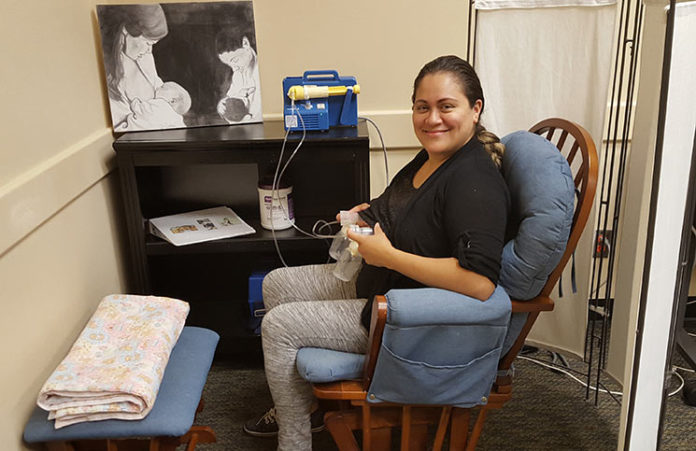
This month’s “Ready, Set, Go!” wellness workshop, sponsored by the Greater Vancouver Chamber of Commerce and the Clark County Breastfeeding Coalition, will focus on educating attendees on breastfeeding in the workplace and is set to take place on Thursday, Sept. 27, at 11:30 a.m.
This working-lunch-and-learn workshop will feature Jennifer Dickison, WIC coordinator for Clark County, and three panel members – Melissa Martin, MPH Healthy Communities-Chronic Disease Prevention Program at Clark County Public Health; Hester Carr, Perinatal Clinical Nurse Specialist at Legacy Health; and local business owner of Thatcher’s Coffee Jamie Erdman. The venue will provide a discussion as well as panel members who will speak and share their personal experiences, as well as ways to educate attendees on the “Best Practices for Breastfeeding in the Workplace What Employers and Employees Need to Know.”
Set for Sept. 27, the doors will open at 11:30 a.m. and will feature healthy lunch selections by Chick-fil-A. The program will begin at noon and will last approximately one hour. Chamber members and invited guests will attend. Cost of the event is $15 and includes lunch. The workshop will be presented by Mackenzie in their second story conference room in the Hudson Building, 101 E. 6th St., Suite 200, Vancouver.
Panel Moderator Tricia Pace, Lactation Promotion Supervisor for Sea Mar Community Health Centers will moderate the presentation and workshop.
“The goal or purpose of this event is to increase awareness of the importance, value and legal requirements of supporting breastfeeding employees as well as customers/clients in work sites and businesses,” Pace said. “Attendees will learn about a variety of ways these requirements can be accomplished and what a win-win outcome such support and compliance can elicit.”
The federal workplace law that went into effect in March of 2010 requires employers to provide break time and a place (other than a bathroom) for most hourly wage-earning and some salaried employees (nonexempt) to express breast milk at work. The law states that employers must provide a “reasonable” amount of time and that they must provide a private place other than a bathroom. They are requested to provide this until the employee’s baby turns 1 year old.
Providing a place that is shielded from view and free from intrusion is an important part of the culture at Thatcher’s Coffee Shop located in Vancouver.
“We want everyone to feel welcome,” said Owner of Thatcher’s Coffee and mother Jamie Erdman. “It was my goal to create a warm welcoming supportive environment as well as a kid-friendly environment. I have created a small space in the backroom area of the coffee shop where moms can pop in and relax and feed their baby.”
Erdman saw the need and realized that it was her job to come up with a policy for her employees as well as the customers.
“I created an employee handbook to essentially outline how I expected my employees to handle customers who chose to breastfeed in our establishment,” Erdman said. “I figured if they were uncomfortable then it would transfer to our customers, so writing the policy to reflect the view of how to be welcoming and accepting seemed like the natural thing to do.”
Panel member Melissa Martin said she appreciates being in a supportive work environment.
“As a public health professional, I know the immediate and long-term benefits of breastfeeding,” Martin said. “When I returned to work after having my son, I was so appreciative of the policies and practices that my employer has in place to help breastfeeding employees express milk at work. It made the transition back to work so much easier for my family and the organization.”
Clark County Public Health Department has two nice lactation rooms, comfortable chairs, refrigerators, a sink in one of the rooms, a table and even a place to put a photo of one’s baby for inspiration. Breastfeeding employees are given a key, so they will feel safe and have uninterrupted privacy. A flexible work schedule and a shared pumping schedule calendar allows employees to block out times to ensure a room will be available. They even have hospital-grade pumps that are safe to share if a mother needs a pump to use while at work.
The hope is that this event will create an open discussion, more support from employers both large and small as to what the needs and obstacles might be, and how small adjustments can make a tremendous impact for the employee as well as the company.
“Studies show how important breastfeeding is to the health of both the mother and her baby,” Pace said. “Breastfeeding, with its many known health benefits, builds up immunity, prevents illness and gives mom and baby that extra protection they need. There is also a cost savings involved in not paying for formula. We are hoping to stem the tide of new mothers returning to work who need to make that difficult choice to supplement or wean their infants before they intended to due to the challenges and demands of work environment. The benefits to both the employee as well as the company will really be the heart of what this discussion is all about.”



